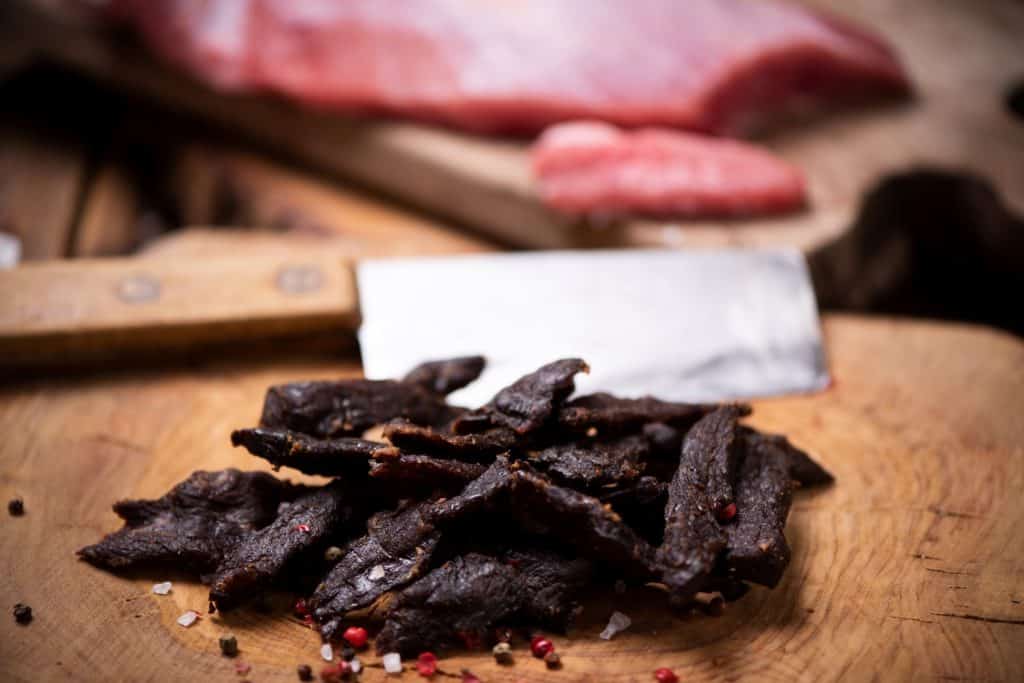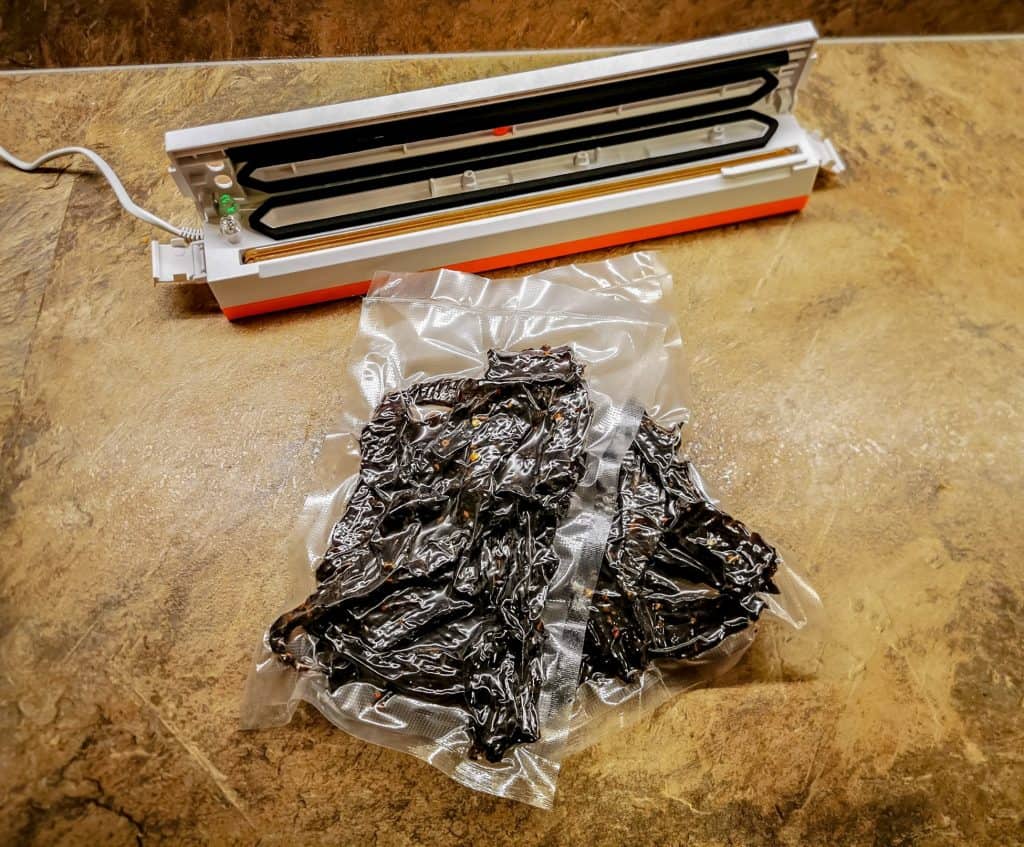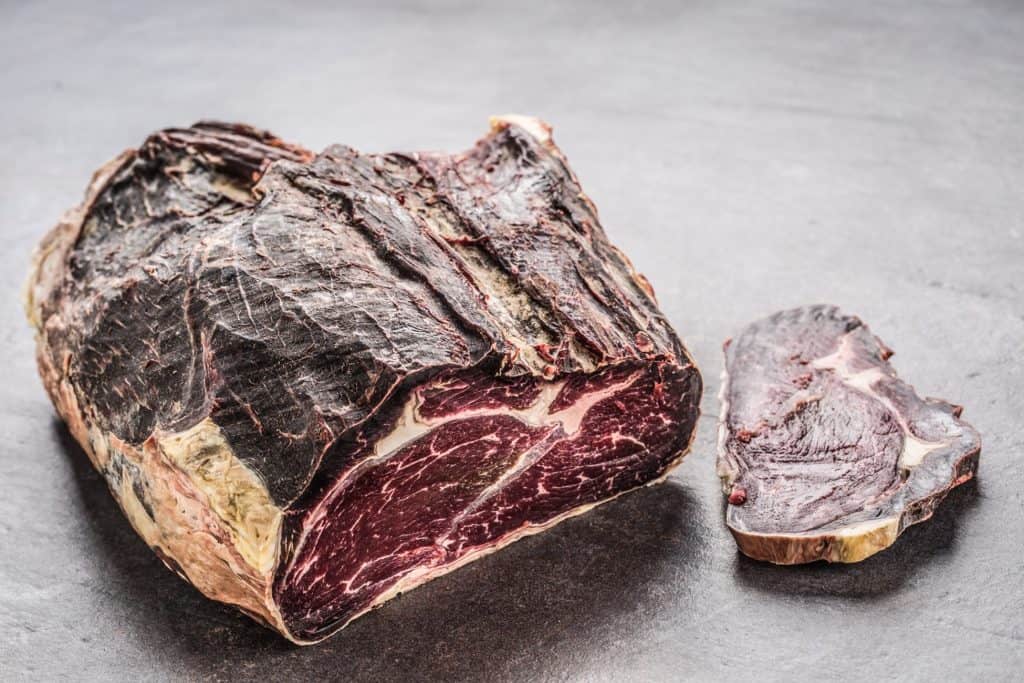Beef jerky is a nice snack that’s delicious, easy to store, and very filling. It’s great to munch on while out in the mall or even at the zoo, but can you eat beef jerky while pregnant?
What about all the sodium – how do you best deal with it?
Pregnant women can eat beef jerky, but eating too much may lead to serious health risks like hypertension or weight gain. It’s also important that you store beef jerky properly to avoid contamination, as food poisoning is very dangerous for pregnant women.
Homemade beef jerky gives you greater control over the sodium levels but requires even more stringent preparations in kind. You’re rewarded for your efforts with safe, tasty beef jerky, so it’s still well worth the effort to follow the preparation guidelines.
Beef jerky is a great pregnancy snack, and it’s more than safe to eat if you take the proper precautions with portion control, storage, and preparation. We’ll go in-depth down below.
Beef Jerky for Pregnant Women (What to Consider)
Health and Nutrition

While you can eat beef jerky while pregnant, there are some caveats to consider.
Beef jerky is high in sodium – a chemical that increases water retention. This can cause health conditions like hypertension and weight gain.
Hypertension is a serious concern, as it puts extra strain on a pregnant woman’s organs, which in turn puts them at risk of kidney failure or stroke. Weight gain may lead to obesity if left unchecked, leading to potential birth defects (heart and NTD) or even cases of gestational diabetes.
A note: the sodium levels of beef jerky won’t subside over time, but increase in concentration inversely to the moisture of the jerky. This difference in concentration is rarely relevant – unless you’re eating a ton of beef jerky in one sitting, the most you’ll notice is being a little thirstier.
Foodborne Illness Risk
Like most other meat products, Beef jerky has the chance of accumulating bacterial contamination. While you can cure beef jerky from raw meat, most guides advise pre-cooking for a reason – and this goes double for pregnant women who want to enjoy beef jerky!
Two commonly encountered foodborne bacteria are Salmonella and E. coli. Salmonella causes an awful disease called salmonellosis, with symptoms like diarrhea and abdominal cramps being particularly cruel to pregnant women. E. coli is similar but causes other problems like kidney failure or anemia – conditions that won’t bode well for a prospective mother.
Remember that beef jerky also has high sodium content, which ends up exacerbating a lot of problematic food poisoning side effects (diarrhea and kidney failure in particular). Similarly, when consuming seafood like crawfish, pregnant women need to ensure it’s thoroughly cooked to reduce risks associated with bacterial contamination.
This is why it’s so crucial to pre-cook your jerky meat before drying!
Safely Storing Beef Jerky
Proper storage is critical to ensure both the safety and overall quality of your end product. Here’s how you can best store beef jerky for pregnant women to enjoy.
Temperature Differences
If you’re planning to finish your stock of beef jerky within the week, it’s perfectly fine to store it at room temperature – but do be sure it’s placed in an airtight container beforehand.
While this method leaves you with the shortest shelf life for your jerky, it’s more than sufficient for your short-term storage needs. Just remember to bear this limitation in mind.
If you want to make it last a bit longer while staying practical to access, storing it in your fridge is your best bet. This buys you an extra week of shelf life (2 weeks total now) and still lets you eat it immediately – though we personally prefer to reheat the jerky first!
Lastly, you can also opt to put them away in the freezer. This method lets your beef jerky stay palatable for up to 6 months but comes at the cost of immediate accessibility. Also, keep in mind that thawed beef jerky can’t be returned to the freezer – be sure to eat it quickly afterwards.

Additionally, if you happen to have a vacuum sealing machine, you could store your beef jerky in these rather than a Ziploc bag or plastic container. Vacuum-sealing beef jerky removes all the air and moisture from the container, greatly extending its shelf life. We’d recommend doing this if you’re making a really big batch of beef jerky, but we don’t find it worth the hassle otherwise.
Pregnant women can only eat beef jerky if it’s been handled properly, so make sure to keep them in a cool, dry place to minimize moisture and bacterial exposure. Don’t be afraid to discard bad or expired batches, and always check if your beef jerky still looks or smells right before eating.
What About Homemade Beef Jerky?

Homemade beef jerky has its perks – you can control the cooking process and sodium levels. It may even be the best way for pregnant women to eat beef jerky, but it has to be done right.
Be sure to pick up high-quality cuts of meat for this – don’t skimp out on your purchase. Make sure to wash and disinfect everything before you start preparing your jerky.
We’d recommend that you keep a meat thermometer on hand to mitigate foodborne illnesses (be sure to hit 160°F or 71°C to kill most foodborne bacteria). Remember to do this for both the pre-cooking and drying stage – this is doubly important a step for pregnant women.
Following these guidelines should reward you with quality homemade beef jerky that even pregnant women can enjoy. That said, always leave the final say to your healthcare provider, OB-GYN, or nutritionist – they’ll know far more about your case than we will.
Final Thoughts
Pregnant women can safely eat beef jerky, but it’s not risk-free. You need to mitigate potential foodborne contamination and be mindful of your sodium intake. If you’re making beef jerky at home, play it safe and always make sure to pre-cook your jerky meat beforehand.